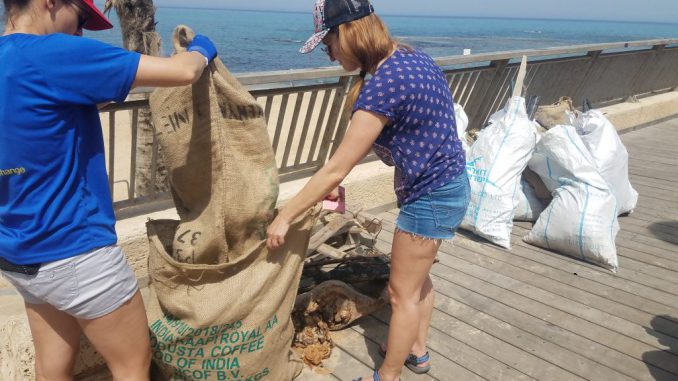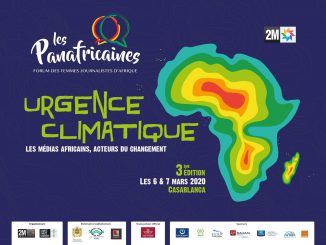
When microplastics researcher Stav Friedman moved to Israel in January 2018, she immediately began to notice the abundant amounts of litter, especially plastic, left on the beaches.
Disturbed by this view, she started looking for a beach clean-up operation or environmental group she could work with, but to no avail.
That’s when she decided to take matters into her own hands.
“It took me about two months to organize my own cleanup, in March 2018. I posted my ad on Facebook and Instagram. Twelve people showed up,” recalls Friedman, an American-born research assistant at the Microplastics Lab at the Medical Research Council Center for Environment and Health at King’s College London School of Population Health & Environmental Sciences.
Stav Friedman is currently completing his thesis on airborne microplastics as part of his Master’s degree in Climate Change: Environment, Science and Policy at King’s.
Although this seems like a small group faced with the immense task ahead of them, it was the starting point for Plastic Free Israel, Stav Friedman’s grassroots organization promoting a plastic-free existence (or at least with minimal plastic consumption).
During the beach clean-up, Stav Friedman met like-minded people from environmental organizations across Israel who helped her create the group.
Plastic Free Israel has become a grassroots movement with monthly beach clean-ups at various locations in Tel Aviv, campaigns focused on how to reduce plastic, and seminars and panels on environmental issues, including plastic waste.
The problem is the plastic
According to Plastic Free Israel, plastic production has reached a record level, with more plastic produced in the last ten years than in the previous century.
Between 22 and 43 percent of the world’s plastic is disposed of in landfills instead of being recycled properly, and about 10 million tons of plastic enters the oceans each year.
It is estimated that 5.25 trillion plastic particles weighing 268,940 tons are currently floating in the oceans. This affects more than 700 marine species. Even the plastic packaging we use has the potential to seep into the food and water we consume if exposed to extreme heat or if the plastic is deformed, worn or of poor quality.
Every year, more than 320 million tons of plastic are produced worldwide. Plastic production is expected to continue to grow by 4% per year for the coming years.
In Israel, wet wipes, disposable plastics and cigarette butts are a major problem and are observed everywhere.
“We did a cleanup at Gordon Beach and collected over 15,000 cigarette butts in less than an hour,” says Stav Freidman.
Plastic Free Israel conducts cleanups at least once a month, she explains, “sometimes more if there are enough volunteers or other groups that we collaborate with”.
Microplastics are everywhere
As part of his research, Stav Friedman examines the effects of microplastics and their effects on our natural environment. Microplastics are formed when plastics are broken down into small pieces due to prolonged exposure to the elements. These fragments (usually between 5 mm and a few micrometers in size) are ubiquitous, found in the ice caps of the Arctic Ocean and even on the distant peaks of the French Pyrenees.
Microplastics have also found their place in our daily lives. The water we drink, dust and even the products we consume, including table salt, sea salt, beer and honey, contain microplastics.
A 2019 study revealed that the average person consumes an average of 50,000 microplastic particles per year.
They are also added to products such as shower gels and toothpastes and end up in the sewer, after which they are dumped into the ocean.
Cup of Coffee Campaign
As consumers, Plastic Free Israel believes that we have the power to speak out and change the way the government views plastics, how schools consume plastics, and how companies and industries produce plastics.
As part of its efforts, Plastic Free Israel launched a coffee campaign in Tel Aviv to reduce the number of disposable coffee cups used by consumers. Disposable coffee cups are made of paper but are also lined with polyethylene. This combination of paper and plastic makes recycling very difficult, and people generally do not recycle.
Plastic Free Israel has partnered with a number of local cafes that will offer discounts to people who bring their own reusable cups.
“People should think about reusing materials instead of throwing them away. It’s difficult in Israel because people like their plastic take-out cups,” Friedman explains. She set up a research team that contacted different coffee shops to discuss incentives for people to bring their own cups. “This type of campaign is effective in Western countries, and now there has been a momentum here,” she adds.
Thanks to social media, this campaign has grown and more and more people and companies have become involved. Plastic Free Israel hopes that this campaign will reach the major coffee networks in Israel.
Tips for living a plastic-free life
“I like the idea of slowing down. Sit down and have a cup of coffee. Have it in a real cup and enjoy it rather than leaving with a plastic cup,” suggests Stav Friedman. “These simple little changes can help you move towards a more enjoyable lifestyle. Make food at home and bring it in a plastic lunch box . Bring cutlery and a bottle of water. Don’t forget these things and slow down a bit. It’s a really great and satisfying lifestyle,” she adds.
Another way to reduce plastic pollution (and pollution in general) is probably the easiest thing to do. If you see garbage, pick it up. According to Plastic Free Israel, “picking up a few pieces here and there is a step towards making a difference. We are all role models for the people around us! »
The organization’s Sustainable Baby Steps blog provides a list of plastic products that can be replaced with reusable products. Some examples include the use of a bamboo keyboard, stainless steel kitchen utensils and wooden toothbrushes.
How to get involved?
Plastic beach clean-ups without Israel are slowly growing and attracting more people. “Sometimes we have more than 100 people at our collaborative beach cleanups, where we partner with different groups and school organizations. We have even partnered with the European Union,” explains Stav Friedman.
To date, Plastic Free Israel has conducted 19 beach clean-ups with more than 900 volunteers, removing 5,500 kilograms of waste from the Israeli coastline. The organization has more than 11,000 subscribers on Facebook and regularly publishes articles about the monthly beach cleanups and other events.
The organization is entirely based on volunteerism. “At the moment we are completely unfunded and we manage everything, from donations of garbage bags, gloves, durable gifts and the incredible volunteers who take so much time to manage the page, manage the content to post on social networks, build relationships and engage with the community – they are really at the heart of what we do,” says Stav Friedman.
She describes Plastic Free Israel as an “incredibly passionate group” that is “deeply moved by the good and terrible things that happen to our natural environment; that’s what drives us to run PFI. »
The organization is divided into teams of volunteers “such as the social media content management teams, or the clean-up team, or the education team”. Stav Friedman says that since many events and campaigns are based on the availability of volunteers, Plastic Free Israel is always looking for more people. Interested people can contact Friedman by email on Plastic Free Israel’s contact page, or via Facebook and Instagram).
“It’s an incredible movement, and I’m so happy to see it grow,” said Stav Friedman.


Be the first to comment